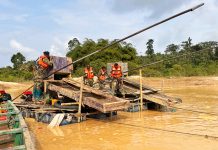Gold Fields Ghana Limited (Tarkwa Mine) and Abosso Gold Limited (AGL- Damang Mine) through the Gold Fields Ghana Foundation has joined the world to celebrate World Malaria Day.
The theme for the celebration was “Time to Deliver Zero Malaria; Invest, Innovate implement.”
The event brought together school children, members of the community, health professionals, farmers, as well as pregnant women.
They were educated on malaria and its prevention, treatment and use of bed nets and mosquito repellants. The participants were also given the opportunity to check their status in terms of malaria. Mosquito repellants were also distributed to all.

Speaking at the ceremony, Abdel Razak Yakubu, Executive Secretary of Gold Fields Ghana Foundation, explained that that Foundation, was committed to improving the health and wellbeing of people in its host communities.
He said, since 2007, the Foundation had joined the international community in the fight against malaria.
“As part of Gold Fields’ contribution to the attainment of Sustainable Development Goal Number 3, which focuses on ensuring healthy life and promote wellbeing, the Foundation has implemented a number of programmes and projects in the health front, including the construction of health facilities, health outreach and weekly radio programmes, where health professionals educate the public on pertinent health issues among others,” he added.
Mr. Yakubu said a health outreach programme was organised each year to extend health care to the doorsteps of communities, and activities undertaken included health education, basic health screening and administering of medicines. Insecticide treated, long lasting bed nets were given out to pregnant women and children below the age of five.
According to him, the Foundation had spent US$2,195,150.92 in support of health and wellbeing activities at Tarkwa.
Damang, on the other hand, has spent US$732,006.94 since its inception.
“The Gold Fields Ghana Foundation has spent a total of US$7,000 at both Tarkwa and Damang Mine on this year’s celebration,” he clarified.
The Executive Secretary of the Foundation urged members of the community to find innovative strategies to eradicate malaria, and encouraged all to embrace the malaria vaccine when the government approves it.
Education on Malaria
Nana Yaa Damoah, Queenmother of Huniso, mentioned some of the symptoms of Malaria as chills, fatigue, fever, nausea, and severe headache among others.
“If you see any of these symptoms, do not go to the pharmacy shop to buy medicine which has not been prescribed by a doctor. Quickly rush to the health center for you to be diagnosed of malaria, it could also be a different ailment,” she said.
She pointed out that children below the age of five and pregnant women were most affected by malaria, and encouraged residents of the community to always keep their environments clean by desilting choked gutters, sweeping and weeding among others.
“Let us do our best to bring Malaria to the barest minimum in our communities, region, and the country as a whole,” she added.
Health Directorate
Timothy Kobina Ofori, Prestea Huni Valley Municipal Health Director, said: “The biggest challenge with malaria has to do with individuals, that is how to prevent it, and most of the time depends on how we take care of our surrounding.”
He reiterated that children under the age of five and pregnant women remained the most susceptible groups globally.
In 2020, he said, 12,962 Malaria cases were recorded among children under five years.14,975 cases in 2021 and 9,726 cases in 2022 in the Prestea Huni Valley Municipality.
Among pregnant women, he mentioned that 3,337 were tested positive for malaria in 2020, and 3,498 were tested positive in 2021, as well as 2,599 in 2022.
He said, since 2021, the World Health Organisation recommended the broad use of vaccine among children living in regions with moderate to high P. Falciparum malaria transmission.
The vaccine, Mr. Ofori explained, had been shown to significantly reduce malaria and deadly severe malaria among children.
“Malaria; elimination of malaria in Prestea Huni Valley Municipality, and the country as a whole, requires a holistic approach, with everyone playing significant roles from the national to the peripheral level, and urged them to sleep in insecticide nets and not to use it as boundary on their farms,” he concluded.









